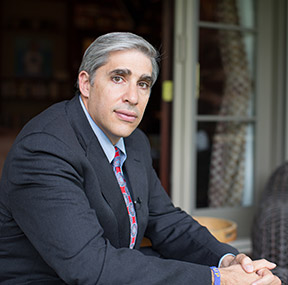By Isabelle Schmidt

On Monday, April 8, 2019, the Social Enterprise Institute and the D’Amore-McKim School of Business were honored to host Gerald Chertavian, founder and CEO of Year Up. SEI and SEISA were also delighted to have Dean Raj Echambadi and Fernando Suarez, Chair of Entrepreneurship and Innovation, welcome and introduce Mr. Chertavian to Northeastern’s campus.
Mr. Chertavian is a NYT Bestselling Author of “A Year Up”, and his company of the same name has gained tremendous recognition for its groundbreaking work in providing disenfranchised youth with opportunities to participate in the mainstream workforce – a field in which those without a college education have been historically excluded. Northeastern has a longstanding relationship with Year Up: every year, the College of Professional Studies accepts several Year Up students to either work in their department or register for classes to count towards their degree.
Seeing an opportunity
It all started in New York City in 1987 when Mr. Chertavian was paired with a 10-year old Dominican boy named David Horatia, who was living in a neighborhood with one of the highest levels of crime and poverty. Through their friendship, Mr. Chertavian witnessed how young people like David and his brothers were turned away from opportunities that students like us at Northeastern are regularly exposed to and have come to expect. “I could not believe that someone like David, who had all the ability in the world, would be limited by his zip code, by his mom’s income, or by his public school system that failed him.” The idea of Year Up came to him as a way to help people like David unlock their full potential.
After Chertavian graduated from Harvard Business School, he worked in software for eight years before pivoting to social impact and founding Year Up in 2000. The company has exhibited remarkable and demonstrated success. What started as a small nonprofit with no corporate connections and a mere 22 employees has now grown into a leader in the social enterprise space with over 900 employees, 18 cities, and more than 250 corporate partners including Facebook, Google, and Goldman Sachs. To date over 4,700 adults young adults have graduated from the program, and their starting salaries have risen to an average of $40,000 (compared to $5,000 a year before they entered the program).
For the many budding social entrepreneurs in the room, Mr. Chertavian had several invaluable pieces of advice.
Don’t be scared by the term “non-profit,” it’s more similar to for-profit than you might think.
Mr. Chertavian has lost count of how many times people that he’d just met immediately lost interest as soon as he mentioned the word “non-profit.” These days, the stigma around non-profits’ capacity, efficiency, growth potential and payscales is still permeable. However, that line of thinking may be out of touch. When he started out, he says nonprofits and for-profits were indeed drastically different in terms of payscales, but today the best nonprofits’ pay on par with for-profits—meaning if you’re concerned about making the jump for financial reasons, don’t worry! Functionally, they’re also converging more and more. “Non-profits and social enterprises share an overlapping duty in that they both have to create value,
“If you can run a social enterprise really well, you will be able to kick butt in the for-profit world. You have my word.”
Cultural competency is key.
Far too often, the government and the private sector have promised low-income communities of color with opportunity, only to fall devastatingly short on their word. As a result, they will obviously be skeptical when they encounter someone like Mr. Chertavian representing Year Up. The secret? Create a staff that reflects the community you serve. About 60% of Year Up Staff are women, and a similar proportion are of color. Diversity is key to creating a trustworthy company.
Lastly, be prepared for tough situations. Such an occupation, especially one that requires such personal investment, can bring hardship and pain. “I have had to bury a lot of 18-year olds.”
Regardless, even if you can’t incorporate social impact (or whatever your passion may be) into your current life right now, do not worry. Using a metaphor of the dial, Mr. Chertavian noted that you will have several opportunities to pivot from one job or passion to another throughout your whole life: “I was lucky enough in my life to be able to turn the dial at 35. For some of you that will be later, for some of you that may come later.” At some point, however, you will be able to make that choice.
In closing, he reminded the audience of the vast privileges that we have by virtue of being students at Northeastern. Only 8% of American adults attend a four –year college and graduate by the time they’re 22. By virtue of the opportunity and access that we students have, we will all have the opportunity to make important decisions that can make this country, and the whole world, a better place.


